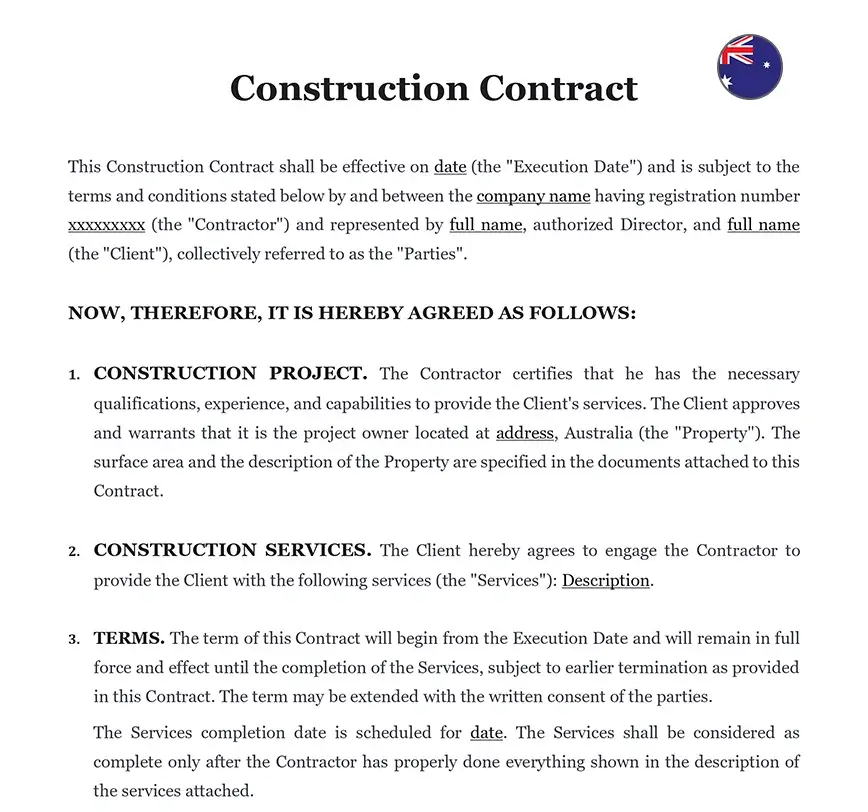Ready to use legal template
Drafted by experienced lawyers
Compliant with Australian law
Ready to use legal template
Drafted by lawyers
Compliant with Australian law
Home › Buy a property › Construction contract
Learn more about Construction Contract in Australia
A Construction Contract is a legally binding agreement between a property owner and a contractor that outlines the terms, conditions, scope of work, timelines, and payment details for a construction project. Its primary purpose is to ensure that both parties clearly understand their rights and responsibilities, reducing the risk of disputes and delays. In Australia, construction contracts are crucial for compliance with local building laws, licensing regulations, and safety standards. Whether for residential or commercial developments, having a well-drafted contract helps protect all parties involved and provides legal clarity throughout the project lifecycle. Download our Construction Contract template available in an easy to edit Word format and drafted by expert to be used in Australia.
Table of contents
-
-
What is a Construction Contract in Australia?
-
What is included in the Construction Contract?
-
Are there specific regulations or licensing requirements that contractors must adhere to?
-
What provisions should be included in Construction Contracts to address delays?
-
How do Construction Contracts in Australia handle issues?
-
What are the typical payment structures outlined in Construction Contracts in Australia?
-
Are there any industry-standard terms or clauses included in Construction Contracts in Australia?
-
What is a Construction Contract in Australia?
A Construction Contract in Australia is a legally binding agreement between a property owner (the client or employer) and a construction contractor or builder. This contract outlines the terms and conditions governing the construction project, including the scope of work, project specifications, timelines, payment terms, and other relevant details. It serves as a roadmap for the construction project, providing clarity on the roles, responsibilities, and expectations of both parties involved.
🔗 If your project requires the hiring of an architect, you can also download our Architect Contract or Interior Design Contract depending on your needs.
What is included in the Construction Contract?
A Construction Contract typically includes several key components to ensure clarity and protect the interests of both the client and the contractor. These components may vary depending on the specifics of the project and the parties involved but commonly include:
1. Project Scope:
A detailed description of the work to be performed, including architectural plans, engineering drawings, and specifications.
2. Timeline:
Clear deadlines and milestones for project completion, including start and end dates, as well as any intermediate deadlines for specific project phases.
3. Payment Terms:
The agreed-upon payment schedule, including the total contract price, progress payments, and any provisions for withholding payments for incomplete or unsatisfactory work.
4. Variations and Changes:
Procedures for handling variations or changes to the original scope of work, including mechanisms for documenting and approving changes and any associated costs or delays.
5. Quality Standards:
Specifications for materials, workmanship, and construction methods to ensure compliance with industry standards and regulatory requirements.
6. Insurance and Indemnity:
Requirements for insurance coverage, such as public liability insurance, workers’ compensation, and professional indemnity insurance, to protect against potential risks and liabilities.
7. Dispute Resolution:
Procedures for resolving disputes or disagreements that may arise during the construction process, including mechanisms for mediation, arbitration, or litigation.
8. Termination Clause:
Conditions under which either party may terminate the contract, such as non-performance, breach of contract, or insolvency, and the process for winding down the project in such cases.
By including these elements in the Construction Contract, both parties can clarify their rights and obligations, mitigate potential risks, and ensure a smooth and successful construction project.
Are there specific regulations or licensing requirements that contractors must adhere to?
Contractors entering into Construction Contracts in Australia must comply with various regulations and licensing requirements to legally perform construction work. These requirements may include holding relevant licenses, registrations, or certifications issued by state or territory regulatory authorities.
For example, contractors may need licenses for building, plumbing, electrical work, or other specialized trades, depending on the scope of the project. Compliance with occupational health and safety regulations, environmental standards, and building codes is also essential to ensure the safety of workers, occupants, and the surrounding community. Contractors should familiarize themselves with the specific requirements applicable to their type of work and jurisdiction to avoid legal penalties or project delays.
What provisions should be included in Construction Contracts to address delays?
Construction Contracts should include comprehensive provisions to address delays and disruptions that may impact the project timeline and progress. These provisions typically outline procedures for identifying, documenting, and notifying the parties of delays, including their causes, duration, and anticipated impact on project completion. Contractors may be entitled to extensions of time to compensate for delays beyond their control, such as adverse weather conditions, client-directed changes, or supply chain disruptions.
The contract may also specify mechanisms for assessing liquidated damages or other remedies for delays attributable to the contractor’s default or failure to meet contractual obligations. Clear dispute resolution procedures, such as negotiation, mediation, or arbitration, should be included to facilitate prompt resolution of delay-related claims and minimize project disruptions.
How do Construction Contracts in Australia handle issues?
Construction Contracts in Australia incorporate provisions to address defects and ensure quality assurance throughout the construction process. These provisions establish requirements for inspecting and testing materials, workmanship, and completed construction elements to verify compliance with contractual specifications, industry standards, and regulatory requirements. Quality control measures, such as regular site inspections, testing protocols, and quality assurance audits, may be implemented to monitor progress and identify potential issues early. Procedures for reporting and rectifying defects, issuing defect notices, and conducting dispute resolution processes, such as conciliation or expert determination, are also specified to address quality-related concerns promptly and fairly.
Additionally, warranties, guarantees, and indemnities may be included in the contract to provide assurance of the contractor’s liability for defects and non-conformance with contractual requirements.
What are the typical payment structures outlined in Construction Contracts in Australia?
Payment structures in Construction Contracts typically involve progress payments based on completed milestones or stages of the project. These milestones may include key phases of construction, such as site preparation, foundation works, structural framing, and building enclosure.
The contract specifies the timing and amounts of progress payments, often expressed as a percentage of the contract price or lump-sum payments for completed stages.
Retention amounts, typically 5-10% of the contract price, may be withheld until final completion and satisfactory resolution of any defects. Payment terms, invoicing requirements, and procedures for resolving payment disputes are also detailed in the contract to ensure fair and timely payment for work performed.
Are there any industry-standard terms or clauses included in Construction Contracts in Australia?
Construction Contracts in Australia often incorporate industry-standard terms and clauses to address common issues and allocate risks between the parties involved. These standard provisions may include clauses related to dispute resolution mechanisms, indemnity and liability, insurance requirements, warranties and guarantees, force majeure events, termination rights, and intellectual property rights.
Employers and contractors should carefully review and negotiate these terms to ensure they reflect the specific requirements and priorities of the project while complying with applicable legal and regulatory requirements. While some standard terms may be non-negotiable or customary within the construction industry, parties should seek legal advice to understand their implications and ensure they align with their respective interests and risk tolerance levels.
Construction ContractTemplate (.docx)
Save on attorney fees
310 client reviews (4.8/5) ⭐⭐⭐⭐⭐
Share information
Why Themis Partner ?
Make documents forhundreds of purposes
Hundreds of documents
Instant access to our entire library of documents for Australia.
24/7 legal support
Free legal advice from our network of qualified lawyers.
Easily customized
Editable Word documents, unlimited revisions and copies.
Legal and Reliable
Documents written by lawyers that you can use with confidence.




